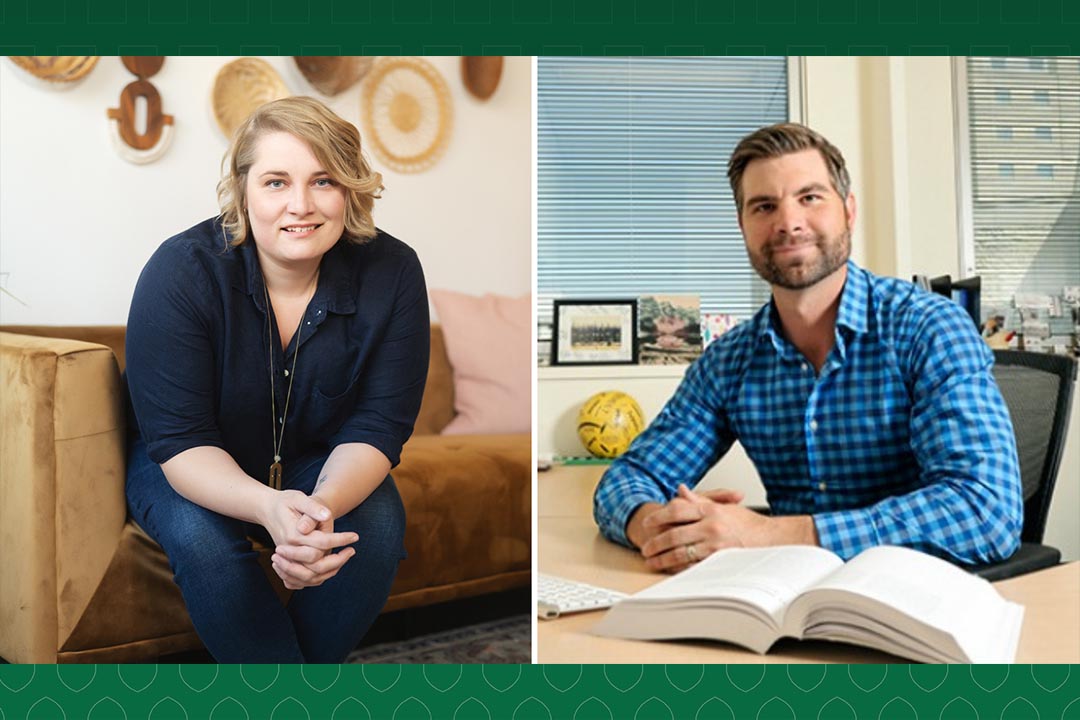
USask research will focus on social justice and physical health in vulnerable populations
Two University of Saskatchewan (USask) research projects will highlight the importance of equitable opportunities for Two-Spirit, lesbian, gay, bisexual, trans and queer (2SLGBTQ+) and Indigenous peoples to participate in their communities throughout life as adult leaders and during their youth.
Dr. Rachel Loewen Walker (PhD) from the College of Law and Dr. Lee Schaefer (PhD) from the College of Kinesiology and their respective research teams will receive funding over a three-year period to undertake important work focused on increasing opportunities for marginalized communities to participate in initiatives that improve social and physical well-being.
The work has been awarded funding from the Social Sciences and Humanities Research Council of Canada (SSHRC) through the Race, Gender and Diversity initiative. This funding program supports community-led research that is grounded in the complexities of the lived experiences of diverse groups and individuals, and that will inform policy and program design in the future.
Building 2SLGBTQ+ representation in governance and leadership
To create social change, one needs an imagination capable of challenging dominant social and cultural ideologies, as well as the opportunity to re-configure the legal, political and educational structures that present barriers to change. Loewen Walker is the project director for a research study entitled, “Queering Leadership, Indigenizing Governance: Building Intersectional Pathways for Two Spirit, Trans, and Queer Communities to Lead Social and Institutional Change.” The goal of the project is to build the capacity of 2SLGBTQ+ individuals to participate in leadership and governance roles in community, non-profit and university organizations.
Barriers to holding these leadership roles will be explored and informed directly by 2SLGBTQ+ individuals and organizations, and research findings will be returned to the community in the form of practice and learning tools, guiding documents and templates, and knowledge sharing events. The project also seeks to explore governance models outside of Western, colonialist frameworks, demonstrating that queer, Indigenous, and other diverse communities are leading the way when it comes to building equitable research and practice.
The project is the outcome of Loewen Walker’s previous SSHRC Partnership Development Grant that funded the creation of the Social Innovation Lab. This unique research group invites community partners to propose needed research projects that trained social science and humanities students then lead. All outputs are returned to and owned by the community.
“The Social Innovation Lab works to flip the dominant research model on its head: rather than having researchers and students approach community partners with an identified project, the lab carries out projects that are community-led,” said Loewen Walker.
“I think it demonstrates the success of models which centre the voices and needs of community partners, and further illustrates that when we work to reduce the hierarchies and power dynamics between research partners, we create space for truly innovative and intersectoral work.”
By building a team of social innovators that are rooted in equity, diversity, inclusion and decolonization, new leadership models will emerge that are informed and built from the needs of populations. New ways of leading and governing organizations thereby will offer increased opportunities for historically underrepresented groups to champion anti-oppressive leadership in non-profit and university sectors.
Breaking down barriers to sport for Indigenous youth
Participating in developmental sports and various physical activities is important for the health and growth of kids around the world. Using the philosophy of the Woodland Cree saying of mitho miskawawin a nehiyaw, loosely translated to “moving well”, Schaefer, along with co-director, Dr. Sean Lessard (PhD), will engage in a research project titled “Mitho Miskawawin Together Partnership (Moving Well Together Partnership – MWTP)” that is a direct response to the Truth and Reconciliation Commission of Canada Calls to Action.
The research will address systemic racism and sexism that creates barriers to movement opportunities, such as physical activities and organized sports, for female Indigenous youth aged eight to 12 years old. Youth will engage directly with the research team to share their own experiences of access to physical activity and challenges they face to accessing physical activity.
“MWTP is grounded in Nehiyaw notions of kistīthītamowin (respect and honour), as well as mamawīchihitowin (sharing and valuing working together),” said Lee. The team is made up of Indigenous and non-Indigenous scholars who will work alongside the Montreal Lake Cree Nation Community, as well as two Nehiyaw Elders and one Nehiyaw language teacher, in a partnership with USask’s Huskie Athletics.
The Moving Well Together Partnership will consist of not just a focus on physical movement, but also spiritual and relational movement by facilitating research efforts rooted in reconciliation and decolonization with hopes of mitigating real-word barriers to activity for Indigenous youth.
“We hope to learn from the community and the girls around how this partnership can create more opportunities for Indigenous girls to meaningfully participate in physical activity, both on and off reserve,” said Schaefer.
“Given the partnership with Huskie Athletics, we also hope this will offer opportunities for the university to create more inclusive opportunities for Indigenous girls. Reciprocally, we hope it also offers opportunities for Huskie Athletes to learn more about reconciliation and become engaged in Indigenous communities.”
-30-
For more information, contact:
Victoria Dinh
USask Media Relations
306-966-5487
victoria.dinh@usask.ca

